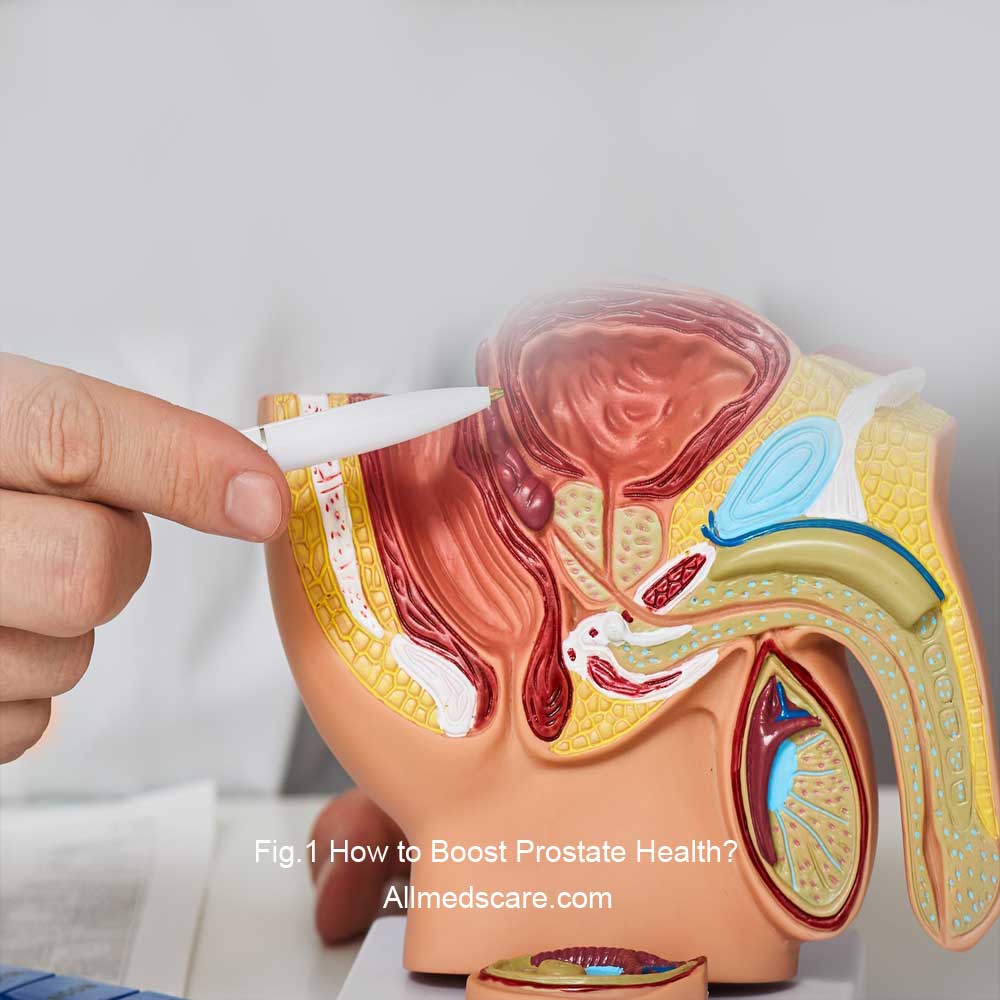
How to Boost Prostate Health?
The phrase “prostate health” refers to the prostate gland’s general state of health. This tiny, walnut-shaped gland contributes to the production of some semen and controls the flow of urine in males. It’s crucial for men to maintain prostate health as they age since it can have an impact on a variety of elements of their lives, such as sexual function, fertility, urine incontinence, and bladder control. It becomes fairly important to know on ways to Boost Prostate Health.
Indicators of more serious illnesses like prostate cancer or prostatitis include prostate (inflammation). All men over 45 should have routine screenings to identify any anomalies early and stop them from developing into more serious issues.
Healthy prostate results in improving mental and physical wellbeing. Making an effort to maintain healthy behaviours today will pay off in the long run.

Identifying Prostate Health Issues
Although diagnosing prostate health problems can be challenging, there are certain risk indicators that men should be aware of. This is because the prostate gland enlarges with age and can cause problems such as difficulty urinating, painful urination, weak urine stream or dribbling or increased frequency after urination. So, if you notice any changes in your urinary habits, talk to your doctor immediately. Other risk factors include family history of prostate cancer, smoking, obesity, and a diet high in animal fats and processed foods. Usually Prostatitis occurs due to bacteria and require antibiotics for treatment . Alternatively, it can occur due to viruses or physical trauma from an injury or surgery. Common causes of prostate health problems range from benign conditions like prostatitis (inflammation) to more serious diseases like prostate cancer.
Diagnosing Prostate Health Issues
Diagnostic procedures determine different prostate health issues. Digital rectal exams (DREs), which enable medical professionals to spot any abnormalities in size or shape, urine samples to screen for infection, and blood tests to monitor PSA levels are a few of the most popular testing (prostate-specific antigen). People should be aware of their own medical background. This can help medical professionals in determining additional testing procedures, such as a biopsy, is required.
Treatment Options for Prostate Health Issues
Medications are one of the most common treatment options for prostate health issues. Based on the condition of a patient, many medications are used to reduce inflammation and pain, address infection, or reduce symptoms such as urinary urgency and frequency.
Surgical treatments are another option for treating certain prostate health issues depending on their severity. For example, a transurethral resection of the prostate (TURP) is a procedure where part of the inner portion of the gland is removed using a special instrument inserted through your penis into your urethra. The procedure is typically done when there has been no response to medication or if other less invasive procedures have failed to improve symptoms.
Natural and alternative therapies are also considered in addition to medication or surgery. Such as regular exercise, eating healthy foods like fruits and vegetables, avoiding processed foods high in fat, managing stress levels through relaxation techniques or cognitive behavioral therapy, including supplements like saw palmetto extract in diet plans, acupuncture, yoga, massage therapy, etc.
Preventing Prostate Health Issues
Preventing prostate health problems is an important part of maintaining overall wellness. In addition to regular check-ups with a medical professional, men can make some changes to their diet and lifestyle, such as reducing animal fat and processed foods and eating more fresh fruits, vegetables, whole grains, lean proteins, and healthy oils, to help prevent prostate health risks.
Balanced diet provides essential vitamins, minerals and other nutrients. It improves prostate health by reducing inflammation and promoting optimal cell growth.
Regular exercise is another important factor for improving prostate health as it helps keep muscles strong while increasing circulation throughout the body including around the pelvic region where the prostate gland resides.
Aim for at least 30 minutes of physical activity per day such as walking or jogging but make sure not to overdo it; too much vigorous exercise could do more harm than good when it comes to this particular area!
Finally, don’t forget about getting enough sleep! Getting adequate restful sleep each night allows our bodies time to repair themselves which means better overall health down the line – something we all want! Pairing these healthy habits together will go a long way towards preventing serious problems from arising in regards to prostate health later on in life making them well worth implementing sooner rather than later!
Conclusion
Addressing prostate health issues is essential to maintaining overall health and quality of life. The sooner changes in urinary habits or other symptoms are noticed and discussed with a doctor, the better the chance of successful treatment.
Medicines, surgery and alternative therapies are all possible options depending on the problem being treated, along with lifestyle changes such as regular exercise, eating healthy foods, etc.
Can take proactive steps to improve their prostate health!





